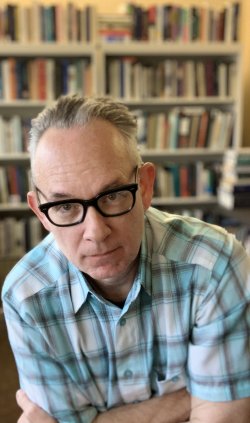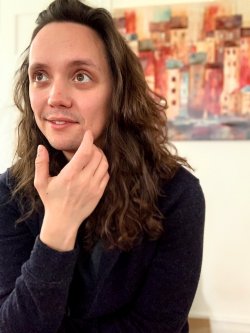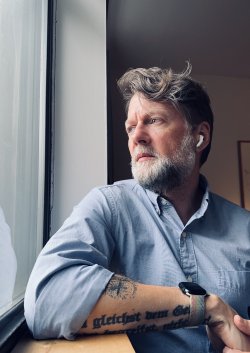Jump to: Administrative Services, Full-Time Faculty, Part-Time Faculty
Department Chair

Tiger Roholt
Department Chair
Schmitt Hall 208
roholtt@montclair.edu
973-655-7417
Office Hours: m2:00–3:30, w11:30–1:00
Tiger Roholt (professor of philosophy) received his PhD from Columbia University. He writes about meaningfulness, technology, art/music. Roholt has written three books, the most recent is Distracted from Meaning: A Philosophy of Smartphones (Bloomsbury Academic, 2023). Groove: A Phenomenology of Rhythmic Nuance was published in 2014 (Bloomsbury Academic). Roholt’s Key Terms in Philosophy of Art has been translated into Chinese, Arabic, and Persian. He has published journal articles in Techné: Research in Philosophy and Technology, The Journal of Aesthetics and Art Criticism, etc. Recently published in The Oxford Handbook on the Phenomenology of Music is Roholt’s chapter, “Performance, Technology, and the Good Life.” He teaches courses such as Contemporary Continental Philosophy, Philosophy of Technology, Existentialism, History of Ethics, and Introduction to Philosophy. More information can be found on Roholt’s Website.
Administrative Services
For general departmental assistance, please email philosophy@montclair.edu
Location: Schmitt Hall, Room 222
Phone: 973-655-7755
Full-Time Faculty

Jon Morgan
Director, Cognitive Science Minor
Schmitt Hall 205E
973-655-7393
morganj@montclair.edu
Drop-in Office Hours: M 1:00–3:00
Appointments: M-F 2:00–4:0
Jon Morgan (associate professor of philosophy) received his PhD from The University of Texas at Austin. His primary research interests are within philosophy of mind, and his work has appeared in Analysis, Australasian Journal of Philosophy, and Philosophical Studies. You can read more about him and his research on his website. He also directs the Cognitive Science Minor. Courses taught at MSU: Introduction to Philosophy, Philosophy of Mind, Philosophy of Perception, Knowing One’s Mind, Color and Color Experience.

Schmitt Hall
richmondd@montclair.edu
Office Hours:
Daniel Richmond (assistant professor of philosophy) completed his PhD in Philosophy at the New School for Social Research in New York in spring of 2021. His dissertation questions the status of possibility in Aristotle, Heidegger, and Ernst Bloch, with emphasis given to the capacity for individual agency. In addition to this, his areas of philosophical expertise include Kant, critical theory, and phenomenology. His areas of interest include social ontology, philosophy of technology, environmental ethics, feminism, queer theory, and philosophy and race. Working primarily within the scope of continental philosophy, Daniel looks to engage notions of identity and agency, and to question traditional conceptions of possibility that condition and inform our notions of humanity. Aiming to uncover those countervailing possibilities that disrupt, shift, and skew to static notions of the status quo and self, he examines aspirational, technological, and ecological fixtures in relation to individual and collective empowerment. At MSU, Daniel is teaching courses such as PHIL 106 Logic, Ethics, and Medical Ethics.

Schmitt Hall 240F
973-655-3833
robisonm@montclair.edu
Office Hours: T 10:30–11:30, R 2:00–4:00
Meghan Robison (associate professor of philosophy) received her PhD from the New School for Social Research. She specializes in Political Philosophy and Early Modern Philosophy, with competence in Feminist Theory and Philosophy of Art. Some of the classes she has taught include: History of Philosophy, Modern; Feminist Philosophy; Social and Political Philosophy; History of Philosophy, Ancient, a Seminar on Theories of Agency. Her research concerns the relationship between embodiment and authority in early modern political philosophy. She is at work on two book-length projects: The first examines figurations of maternity in modern philosophy. The second offers an original interpretation of the exit from the state of nature in Thomas Hobbes’ Leviathan by connecting the English philosopher’s concept of life as a special kind of bodily movement to the contracts that form the basis of the Commonwealth. In connection to this project is her article: “The Appearance of Power in Hobbes’ Leviathan,” Scienza & Politica: vol. 31, no. 60 (2019). A pdf can be found here. • She is a member of the group Philosophers for Sustainability.
Part-Time Faculty
Aaron Bernstein
Ernesto Blanes-Martinez
Madison Gamba
Richard Ganis
Chrysoula Gitsoulis
Danielle Hampton
Ken Howarth
David Kaye
Joshua Kaye
Ryan McElhaney
Josef Mendoza
Phillip Opsasnick
Sean Skedzielewski
Jodell Ulerie
Emeritus Faculty
David Benfield received his Ph.D. from Brown University. He published articles in Kant-Studien, Philosophy and Phenomenological Research and Philosophical Studies. His research interests include the Wason Task (and why the “right” answer isn’t really right), the analysis of fictional objects, the ethical and social aspects of cyberspace, and the new public atheism. A member of the national APA Committee on the Teaching of Philosophy, he participated in three NEH Summer Seminars. He helped develop and then regularly taught the “The Professional Semester,” an experiential education course for liberal arts majors seeking work experience. He served in the University Senate as Chair of the Administrative Affairs Council and as Secretary; he was a member of the faculty union and functioned as the official liaison between AFT Local 1904 and the University Senate from 2009 until his retirement as Professor of Philosophy in 2015.
Roland Garrett received his B.A., M.A., and Ph.D. in Philosophy from Columbia University. He published essays in a variety of professional journals, including Social Theory and Practice, the Journal of the History of Philosophy, Transactions of the Charles S. Peirce Society, Philosophy Today, the Southern Journal of Philosophy, the Journal of General Education, Business and Society, Metaphilosophy, and Philosophy and Literature. He served as Vice President for Academic Affairs at Montclair State University from 1981 to 1987 and retired as Professor of Philosophy in 2015.
